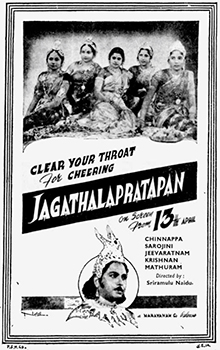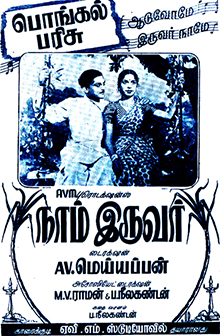
Naam Iruvar is a 1947 Indian Tamil-language drama film directed and produced by A. V. Meiyappan. It is based on the play Thyaga Ullam written by Pa. Neelakantan. The film stars T. R. Mahalingam and T. A. Jayalakshmi. It was released on 12 January 1947 and became a success.
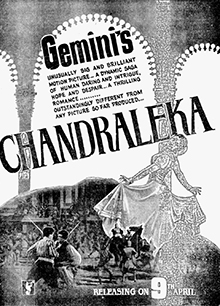
Chandralekha is a 1948 Indian historical adventure film produced and directed by S. S. Vasan of Gemini Studios. Starring T. R. Rajakumari, M. K. Radha and Ranjan, the film follows two brothers who fight over ruling their father's kingdom and marrying a village dancer, Chandralekha.

Haridas is a 1944 Tamil language film directed by Sundar Rao Nadkarni and starring M. K. Thyagaraja Bhagavathar, T. R. Rajakumari and N. C. Vasanthakokilam.
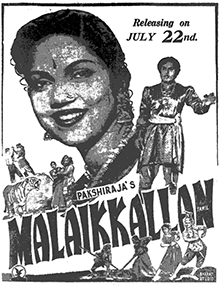
Malaikkallan is a 1954 Indian Tamil-language action film starring M. G. Ramachandran and P. Bhanumathi. The film was released on 22 July 1954, and was an astounding success and highest collection of the year. It ran more than 140 days in Chennai and all other major cities. It was the first Tamil film to win a President's Silver Medal. It was the first Indian movie to be remade in five other languages.

Chintamani is a 1937 Indian Tamil-language film directed by Y. V. Rao starring M. K. Thyagaraja Bhagavathar, Serugulathur Sama and Aswathamma. It was the first Tamil film to run for a year in a single theatre.
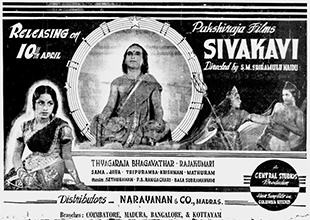
Sivakavi is a 1943 Indian Tamil-language film directed, initially, by P. K. Raja Sandow and later, S. M. Sriramulu Naidu. It starred M. K. Thyagaraja Bhagavathar, S. Jayalakshmi, Serukalathur Sama, Thirupurambal, T. R. Rajakumari, N. S. Krishnan and T. A. Mathuram. The film's screenplay was written by Thiru Muruga Kirubanandha Variyar. The film was shot at Central Studios and released by Pakshiraja Films in Coimbatore. The film was released on 10 April 1943.

Meera is a 1945 Indian Tamil-language musical drama film directed by Ellis R. Dungan, produced by T. Sadasivam and written by Kalki Krishnamurthy. Based on the life of the 16th century mystic and poet Mirabai, the film stars M. S. Subbulakshmi as the eponymous character, a zealous devotee of Krishna, who considers him to be her husband. Despite marrying Rana, she follows her own way of living, which is unacceptable to her husband and his family.

Kalidas is a 1931 Indian biographical film directed by H. M. Reddy and produced by Ardeshir Irani. It is notable for being the first sound film in the Tamil and Telugu languages, and the first sound film to be made in a language from South India. It was based on the life of the Sanskrit poet Kalidasa; it featured P. G. Venkatesan in the title role and T. P. Rajalakshmi as the female lead, with L. V. Prasad, Thevaram Rajambal, T. Susheela Devi, J. Sushila, and M. S. Santhanalakshmi in supporting roles.

Marmayogi is a 1951 Indian Tamil-language swashbuckler film directed by K. Ramnoth and produced by M. Somasundaram. An adaptation of the novel Vengeance by Marie Corelli and William Shakespeare's play Macbeth, the film was shot simultaneously in Hindi as Ek Tha Raja. It stars M. G. Ramachandar, Anjali Devi and Madhuri Devi, with S. V. Sahasranamam, Serukalathur Sama, N. Seetharaman, S. A. Natarajan, M. N. Nambiar and M. Pandari Bai in supporting roles.

Jagadeka Veeruni Katha is a 1961 Indian Telugu-language fantasy swashbuckler film, produced and directed by K. V. Reddy under the Vijaya Productions banner. It stars N. T. Rama Rao, B. Saroja Devi with music composed by Pendyala Nageswara Rao.

Apoorva Sagodharargal is a 1949 Indian Tamil-language action film directed by Acharya. The film which was adapted from Alexandre Dumas' 1844 novella The Corsican Brothers stars M. K. Radha and P. Bhanumathi, with Nagendra Rao and Suryaprabha playing supporting roles. It revolves around the two lookalike brothers who were separated during childhood by their cruel uncle who murdered his parents, rest of the film shows how two brothers join together in avenging the death of their parents.

Aryamala is a 1941 Indian Tamil-language film starring P. U. Chinnappa, M. S. Sarojini, M. R. Santhanalakshmi and T. S. Balaiah. Aryamala was a major box office success and established Chinnappa as a box office hero.
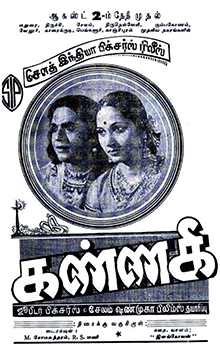
Kannagi is a 1942 Indian Tamil-language epic film directed by R.S Mani based on one of The Five Great Epics of Tamil Literature, Cilappatikaram. This is the first Tamil film based on the epic. The second film, Poompuhar, was released later in 1964.

Utthama Puthiran is the 1940 Tamil language film directed by T. R. Sundaram. P. U. Chinnappa, M. V. Rajamma, T. S. Balaiah played the lead roles. It was the first Tamil film in which the leading actor P. U. Chinnappa played a double role.
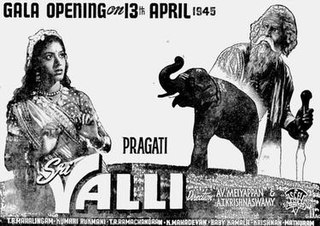
Sri Valli is a 1945 Tamil-language film co-directed by A. V. Meiyappan and produced by him under Pragathi Studios. It was co-directed by A. T. Krishnaswamy who also wrote the script. The film stars T. R. Mahalingam and Kumari Rukmani. Sri Valli revolves around the romance between Muruga and Valli, a tribal girl. The rest of the story shows how Valli wins the heart of Murugan.

Gnana Soundari is a 1948 Indian Tamil-language film written, produced and directed by the duo F. Nagoor and Joseph Thaliath Jr. The film stars T. R. Mahalingam, M. V. Rajamma in lead roles with D. Balasubramaniam, Sivabhagyam, Lalitha and Padmini playing supporting roles. The film revolves around Gnana Soundari, daughter of King Dharmar who is ill-treated by her stepmother Lenal. In order to get rid of her, Lenal sends her to a forest. In the process, Soundari loses both of her hands and she gets saved by prince Pilenthiran.

Pankajavalli is a 1947 Indian Tamil-language film written, produced and directed by S. Soundararajan. The music was by Papanasam Sivan. The film starred P. U. Chinnappa, T. R. Rajakumari and Kumari Rukmani. The film was basically the story of Alli, who dominates men in her kingdom and treats them like slaves. The film was inspired by the popular Kerala folktale Malayala Pankajavalli, which Ayyangar adapted.
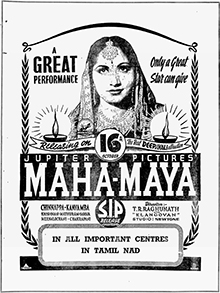
Mahamaya is a 1944 Indian Tamil-language historical drama film directed by T. R. Raghunath, starring P. U. Chinnappa and P. Kannamba. It was released on 16 October 1944.

Dayalan is a 1941 Indian, Tamil-language film produced by T. R. Sundaram and directed by A. Mithra Das. The film stars P. U. Chinnappa, T. R. Mahalingam and K. V. Jayagowri.

Kanniyin Kathali is a 1949 Indian Tamil-language romantic comedy film directed by K. Ramnoth, who produced it with A. K. Sekhar and wrote the screenplay. An adaption of the play Twelfth Night by William Shakespeare, it stars Madhuri Devi, Anjali Devi and S. A. Natarajan. The film revolves around the twins Adithan and Chandrika, who are separated in a shipwreck. Chandrika falls in love with Prince Vasanthakumar, who in turn is in love with Megala Devi. Upon meeting Chandrika, Megala falls in love with her, thinking she is a man. Kanniyin Kathali was released on 6 August 1949.
